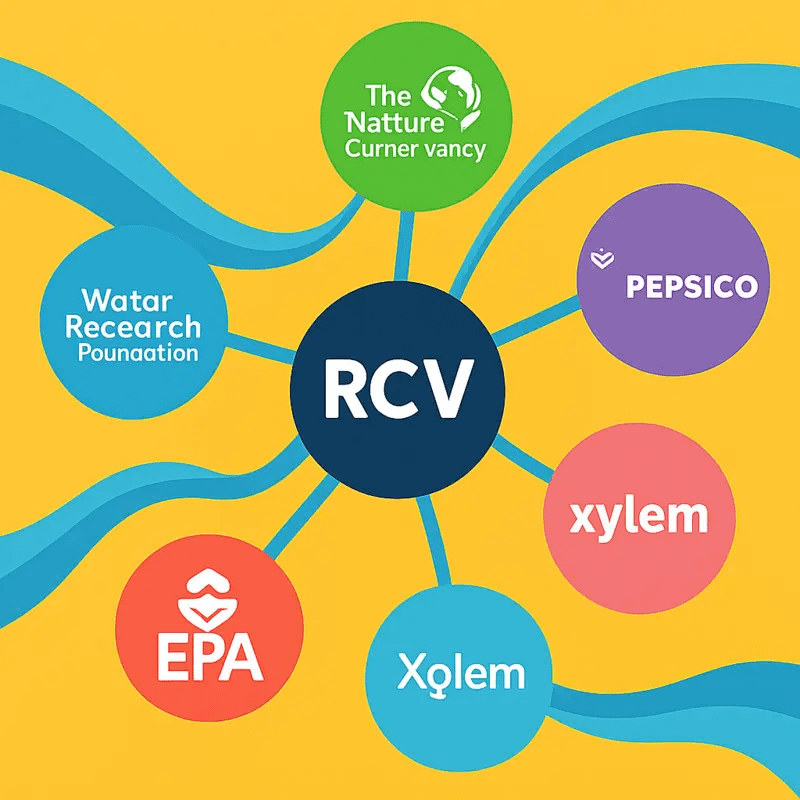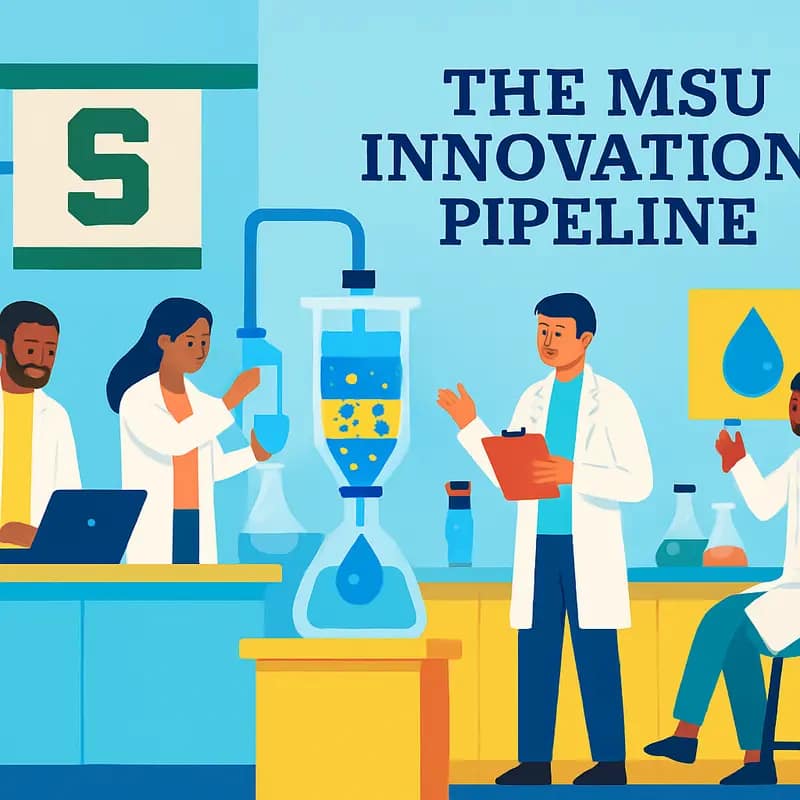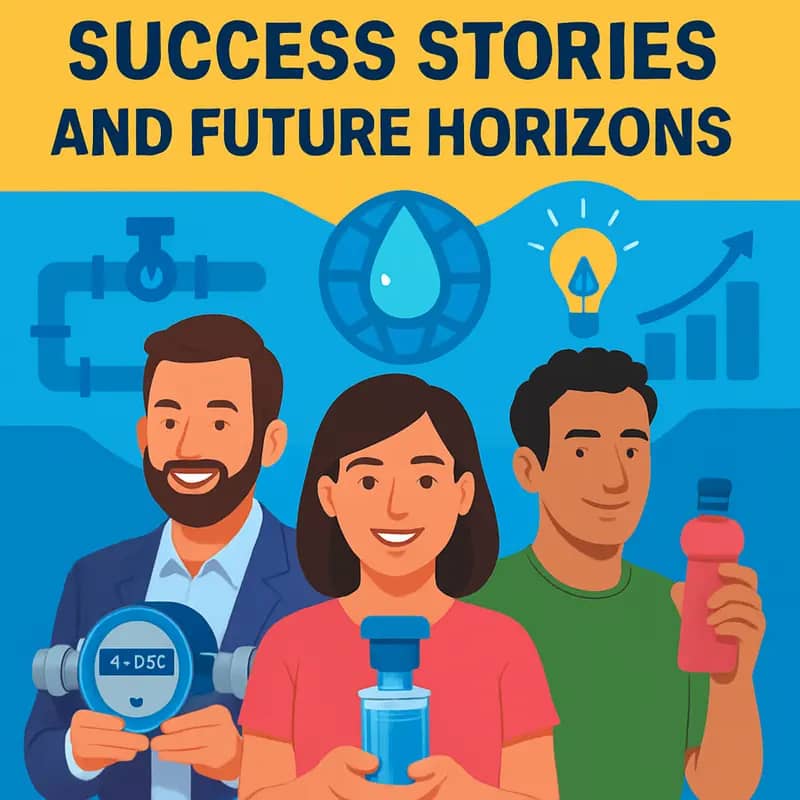Nestled in the heart of Michigan’s research corridor, Red Cedar Ventures (RCV) has emerged as a pivotal force in water technology innovation. With $45.5 million under management and a laser focus on early-stage startups, this Michigan State University Foundation subsidiary is strategically positioned at the intersection of academic research and commercial water solutions. Their unique approach combines pre-seed funding with deep technical expertise, creating a breeding ground for water entrepreneurs who are tackling everything from infrastructure monitoring to advanced materials for water treatment. As water challenges intensify globally, RCV’s model of nurturing university-born innovations offers valuable lessons for both entrepreneurs and impact investors seeking to make a splash in the water sector.
Red Cedar Ventures is part of my Ultimate Water Investor Database, check it out!
Investor Name: Red Cedar Ventures
Investor Type: VC
Latest Fund Size: $45.5 Million
Dry Powder Available: Yes
Typical Ticket Size: <$250k
Investment Themes: Water Infrastructure/Inspection, Advanced Materials and Engineering Solutions, AI & Digital Technologies in Water
Investment History: $571428.57 spent over 2 deals
Often Invests Along:
Already Invested In: Accelerated Filtration, Inc., Enspired Solutions
Leads or Follows: Lead
Board Seat Appetite: Moderate
Key People: Jeff Wesley, Matt Okoneski, Tommy Skinner, Pete Martin
The Investment Philosophy: Where Academia Meets Innovation

Red Cedar Ventures (RCV) has crafted a distinctive investment approach that bridges the gap between academic research and commercial water innovation. At the heart of their strategy lies a carefully calibrated funding model that starts with modest $25,000 initial checks – an amount carefully chosen to validate early-stage concepts while managing risk exposure.
This conservative entry point belies RCV’s true investment potential, as evidenced by their average round size of $341,000. The progressive scaling reflects their commitment to supporting promising ventures through critical growth phases. As highlighted in their investment approach, RCV operates through two complementary funding vehicles: the Pre-Seed Fund and the Opportunity Fund.
The Pre-Seed Fund serves as an initial launching pad, focusing on nascent technologies emerging from Michigan State University’s research ecosystem. This fund plays a crucial role in transforming laboratory breakthroughs into viable commercial prospects. The emphasis here isn’t merely on financial support – RCV provides vital connections to industry partners, helping academic innovations find practical applications in the water sector.
Meanwhile, the Opportunity Fund steps in at later stages, providing follow-on capital to the most promising ventures. This dual-fund structure creates a robust pipeline that nurtures water innovation from concept to commercialization. The approach has proven particularly effective in the Great Lakes region, where water technology needs intersect with academic research capabilities.
RCV’s investment philosophy stands out for its emphasis on academic-industrial partnerships. Rather than viewing university research and commercial interests as separate spheres, they actively foster collaboration between academics and industry veterans. This cross-pollination of expertise has proven crucial in addressing complex water challenges, from infrastructure modernization to advanced treatment technologies.
The venture arm’s success metrics extend beyond traditional financial returns. They measure impact through technology adoption rates, water quality improvements, and the creation of sustainable water management solutions. This holistic approach to value creation has positioned RCV as a catalyst for water innovation, particularly in developing solutions that address the unique challenges of the Great Lakes region.
Water Technology Focus: From Infrastructure to Advanced Materials

Red Cedar Ventures has strategically positioned its water technology investments to address the most pressing challenges facing the Great Lakes region. Their portfolio showcases a comprehensive approach spanning critical infrastructure, advanced materials, and digital solutions.
Infrastructure inspection and maintenance represent a cornerstone of RCV’s investment thesis. The success of portfolio company Motmot exemplifies this focus – their AI-powered robotics platform revolutionizes underground pipe assessment by combining advanced sensors with machine learning algorithms. This technology enables utilities to detect potential failures before they occur, significantly reducing water losses and maintenance costs across Michigan’s aging infrastructure networks.
In the advanced materials space, RCV has backed several breakthrough technologies for water treatment. Their investments target innovations in membrane technology, advanced filtration materials, and novel separation processes. These solutions directly address regional priorities like PFAS contamination and industrial wastewater treatment. The fund’s portfolio companies are developing materials that achieve higher removal rates while reducing energy consumption and operating costs.
The digital water segment represents RCV’s forward-looking vision for the industry. Their investments in smart monitoring systems, predictive analytics platforms, and automated control solutions are helping utilities transition toward data-driven operations. These technologies enable more efficient resource allocation, improved customer service, and enhanced environmental compliance.
What sets RCV’s approach apart is how closely their investment themes align with Michigan’s specific water challenges. The Great Lakes region faces unique pressures from aging infrastructure, emerging contaminants, and climate change impacts. RCV’s portfolio companies directly address these challenges while leveraging the region’s strong industrial base and research institutions.
The fund’s investment strategy reflects a deep understanding of both technical innovation and market dynamics. Rather than pursuing trendy technologies, they focus on solutions with clear paths to implementation and scalability. This pragmatic approach has helped portfolio companies move from laboratory concepts to commercial deployment, particularly in municipal and industrial markets where adoption cycles traditionally move slowly.
Strategic Partnerships: Building a Water Innovation Ecosystem

Red Cedar Ventures (RCV) has established itself as a pivotal force in Michigan’s water technology landscape through a sophisticated co-investment strategy that amplifies impact while minimizing risk. By partnering with established organizations like Invest Detroit and the Michigan Economic Development Corporation (MEDC), RCV creates powerful funding syndicates that provide startups with both capital and strategic support.
The venture firm’s partnership approach extends beyond mere financial collaboration. When RCV invests in water technology companies, they typically secure board observation rights or board seats, allowing them to actively guide portfolio companies through critical growth phases. This hands-on involvement enables RCV to leverage its extensive network within Michigan’s water ecosystem, connecting portfolio companies with potential customers, research facilities, and industry experts.
Michigan’s unique position as a Great Lakes state provides RCV portfolio companies with an unparalleled testing ground for water innovations. The region’s diverse water challenges – from aging infrastructure to industrial water treatment needs – create real-world validation opportunities that accelerate technology development and market adoption. RCV actively facilitates partnerships between its portfolio companies and regional utilities, industrial facilities, and research institutions, creating a robust validation network that strengthens the entire ecosystem.
The firm’s strategic approach to ecosystem building focuses on three key elements: infrastructure access, technical validation, and market connectivity. Through partnerships with universities and research centers, portfolio companies gain access to specialized testing facilities and technical expertise. Relationships with municipal utilities provide opportunities for pilot projects and real-world deployment. Industry partnerships open doors to commercial applications and scale-up opportunities.
RCV’s co-investment partnerships have proven particularly effective in addressing the capital-intensive nature of water technology development. By bringing together multiple funding sources, the firm helps portfolio companies secure the substantial capital needed for technology demonstration and commercialization. This approach has notably increased the success rate of water technology startups in the region, as evidenced by several successful exits and growing commercial deployments.
Particularly noteworthy is RCV’s role in fostering innovation and agility within the water sector. The firm’s strategic partnerships have created a self-reinforcing cycle where successful deployments attract additional investment, talent, and opportunities to the region. This virtuous cycle strengthens Michigan’s position as a water technology hub while addressing critical water challenges facing the Great Lakes region and beyond.
Future Horizons: Scaling Water Innovation Beyond Michigan

Red Cedar Ventures (RCV) stands poised to expand its impact on water technology innovation far beyond Michigan’s borders. Building on its successful foundation in the Great Lakes region, RCV is strategically positioning itself to address global water challenges through an ambitious yet measured approach to scaling its investment model.
The venture firm’s follow-on investment strategy focuses on supporting portfolio companies through critical growth phases. Rather than taking a spray-and-pray approach, RCV maintains deep involvement with its most promising water technology ventures, often leading subsequent funding rounds to help companies scale their solutions. This hands-on strategy has proven particularly effective for water technology startups, which typically face longer commercialization timelines than software companies.
A key element of RCV’s expansion vision centers on creating replicable models for water innovation that can be adapted across different regions and contexts. The firm leverages Michigan’s unique water assets—including the Great Lakes, strong research institutions, and established industry partnerships—as a testing ground for solutions that can address similar challenges globally.
Beyond geographical expansion, RCV is developing specialized investment theses around critical water challenges like infrastructure modernization, water quality monitoring, and resource recovery. These focused initiatives allow the firm to build deep expertise while creating natural pathways for portfolio companies to scale internationally.
RCV’s approach to scaling impact also involves strategic coordination with other water technology investors and accelerators. By building bridges between regional innovation hubs, the firm helps create smoother pathways for promising technologies to reach new markets. This collaborative approach helps de-risk investments while accelerating the adoption of breakthrough solutions.
Looking ahead, RCV is exploring innovative financing mechanisms to unlock larger pools of capital for water technology deployment. This includes blended finance approaches that combine venture capital with strategic corporate investment, government funding, and impact investment to create more robust scaling opportunities for portfolio companies.
The firm’s vision for addressing global water challenges focuses on identifying and scaling solutions that are both commercially viable and environmentally sustainable. This dual focus on financial returns and positive impact positions RCV to attract a broader range of investors while ensuring that portfolio companies maintain their commitment to solving critical water challenges as they grow.
The MSU Innovation Pipeline

At the heart of Red Cedar Ventures’ water technology initiatives lies Michigan State University’s robust research ecosystem. The venture arm strategically leverages MSU’s extensive intellectual property portfolio and world-class research facilities to identify and accelerate promising water innovations from laboratory concept to market-ready solutions.
MSU’s College of Engineering has established itself as a powerhouse in water technology research, with multiple specialized laboratories focusing on areas like membrane development, water quality monitoring, and advanced treatment processes. The university’s proximity to the Great Lakes provides researchers with a living laboratory for testing and validating new technologies in real-world conditions.
One notable innovation stream emerges from the university’s Environmental Engineering laboratories, where researchers have pioneered new approaches to removing emerging contaminants from water supplies. Their work has led to breakthrough developments in advanced oxidation processes that can eliminate persistent organic pollutants more efficiently than conventional treatment methods.
The university’s Water Research Laboratory has been particularly productive in developing novel sensor technologies for real-time water quality monitoring. These innovations combine advanced materials science with data analytics to provide more accurate and cost-effective solutions for detecting contaminants in water systems.
Red Cedar Ventures has established a systematic approach to evaluating and commercializing these innovations. The process begins with early-stage technical assessment, followed by market validation and commercial viability analysis. This rigorous evaluation ensures that only the most promising technologies receive investment and support.
The venture arm’s connection to MSU’s broader innovation ecosystem provides unique advantages in technology development. Researchers can access specialized equipment, testing facilities, and collaborative opportunities with industry partners. This infrastructure enables faster prototype development and more effective validation of new technologies.
Beyond technical resources, Red Cedar Ventures taps into MSU’s extensive network of water industry relationships. These connections help bridge the gap between academic research and practical application, ensuring that innovations address real market needs and have clear paths to commercialization.
Particularly noteworthy is the venture arm’s focus on sustainable water solutions. Several promising technologies in the pipeline address critical challenges like water reuse, energy-efficient treatment processes, and resource recovery from wastewater. These align with both environmental imperatives and market demands for more sustainable water management solutions.
Linking research to: How Will the Trial Reservoir Change Piloting Forever and for Good, MSU’s approach to technology validation has created a model for accelerating water innovation development while maintaining rigorous scientific standards.
Investment Strategy and Impact Metrics

Red Cedar Ventures employs a rigorous dual-lens approach to evaluate potential water technology investments, weighing both financial returns and environmental impact. The fund’s investment thesis centers on scalable solutions addressing critical water challenges in the Great Lakes region while maintaining commercial viability.
The core investment criteria follow a structured framework that examines three key dimensions. First, the technology’s potential for meaningful water impact – measured through metrics like gallons saved, contaminants removed, or efficiency gains. Second, market opportunity and scalability, with preference given to solutions addressing established pain points in municipal or industrial applications. Third, the strength of the founding team and their ability to execute.
Typical investments range from $250,000 to $1 million in early-stage companies, though follow-on funding is available for high-performing portfolio companies. The fund maintains strict requirements around intellectual property protection, particularly for university spin-outs leveraging MSU research. Environmental, Social, and Governance (ESG) considerations are deeply embedded in the due diligence process.
To measure success, Red Cedar Ventures tracks both traditional venture metrics and impact indicators. Financial metrics include standard measures like Internal Rate of Return (IRR), cash-on-cash multiple, and time to exit. However, equal weight is given to impact metrics aligned with the United Nations Sustainable Development Goals, particularly SDG 6 (Clean Water and Sanitation).
Specific impact metrics include:
- Gallons of water saved or treated
- Reduction in energy consumption
- Decreased chemical usage
- Number of people gaining improved water access
- Ecosystem benefits like reduced pollution discharge
Portfolio companies must report quarterly on both financial and impact metrics, enabling Red Cedar Ventures to track progress and provide targeted support where needed. This data-driven approach has proven effective, with the fund’s water technology investments showing an average 2.3x return while collectively treating over 1 billion gallons of water annually.
In line with the fund’s commitment to transparency, impact data is shared with stakeholders through annual reports and a public dashboard. This approach has helped attract additional capital to the region’s water technology ecosystem, as investors increasingly seek opportunities combining strong returns with measurable environmental benefits.
As discussed in how impact investing can mitigate water risks, this balanced investment strategy positions Red Cedar Ventures as a catalyst for water innovation while ensuring sustainable returns for investors.
Startup Support Ecosystem

Red Cedar Ventures has built a comprehensive support infrastructure that goes far beyond traditional funding models to nurture water technology startups. At the core of their ecosystem lies deep integration with Michigan State University’s research facilities, providing portfolio companies with access to state-of-the-art water testing laboratories and pilot-scale treatment systems.
The venture fund’s mentorship program pairs founders with seasoned water industry veterans who provide strategic guidance on technology commercialization, regulatory compliance, and market entry strategies. These mentors, drawn from Red Cedar’s extensive network, bring decades of experience in areas like municipal water operations, industrial water treatment, and environmental compliance.
Portfolio companies receive privileged access to MSU’s extensive research capabilities, including analytical chemistry labs, microbiology facilities, and environmental testing chambers. This infrastructure access dramatically reduces R&D costs while accelerating product development timelines. The university’s world-class faculty also serve as technical advisors, helping startups optimize their technologies and validate performance claims.
Red Cedar has forged strategic partnerships with regional utilities, industrial water users, and regulatory agencies across the Great Lakes region. These relationships provide startups with real-world testing sites, customer discovery opportunities, and pathways to initial commercial deployments. The fund leverages its position within Michigan’s water technology cluster to facilitate introductions to potential customers, partners, and follow-on investors.
Recognizing that water startups face unique commercialization challenges, Red Cedar provides specialized support for navigating complex regulatory requirements and lengthy municipal procurement cycles. Their in-house regulatory affairs team helps companies develop testing protocols, prepare permit applications, and engage with relevant agencies. The fund also maintains relationships with procurement officials at major utilities to help startups understand bidding processes and qualification requirements.
Beyond technical and regulatory support, Red Cedar offers extensive business development resources. Portfolio companies receive assistance with financial modeling, pricing strategies, and go-to-market planning. The fund’s marketing team helps startups refine their value propositions and develop compelling sales materials. Regular founder roundtables and networking events foster peer learning and collaboration across the portfolio.
This holistic support system, combining deep technical resources with commercial expertise and industry connections, has proven critical for helping water startups bridge the commercialization valley of death. As detailed in How to Actually Win in a Competitive Mature Niche Market, such comprehensive ecosystem support can dramatically improve success rates for emerging water technologies.
Success Stories and Future Horizons

Red Cedar Ventures’ strategic investments in water technology have yielded several breakthrough success stories that demonstrate Michigan’s growing prominence in water innovation. These victories illuminate the fund’s vision for transforming water challenges into opportunities across the Great Lakes region.
One standout portfolio company developed an advanced membrane filtration technology that reduces energy consumption by 40% compared to conventional systems. By combining novel materials science with smart controls, this innovation enables more sustainable and cost-effective water treatment. The technology has been successfully deployed at multiple municipal facilities, validating its commercial viability.
Another portfolio success story involves a startup that created an AI-powered leak detection system. This solution has helped water utilities prevent millions of gallons in water losses while generating significant cost savings. The company’s rapid growth and subsequent acquisition by a major industry player highlights Red Cedar’s ability to identify and nurture transformative technologies.
Looking ahead, Red Cedar Ventures has outlined an ambitious vision focused on three key investment themes. First, the fund aims to accelerate the development of technologies that enable water reuse and resource recovery. This includes innovations in treatment processes, monitoring systems, and circular economy solutions that can help utilities transition to more sustainable operations.
Second, Red Cedar is actively seeking opportunities in digital water technologies that leverage AI, IoT, and advanced analytics. The fund recognizes that smart water management systems will be crucial for addressing infrastructure challenges while improving operational efficiency.
Third, the fund plans to expand its investment in climate resilience solutions. This encompasses technologies for flood prediction and management, stormwater treatment, and water conservation – all increasingly critical for Great Lakes communities facing climate change impacts.
Red Cedar’s future investment strategy also emphasizes solutions that can scale beyond the region. The fund recognizes that water challenges are global, and technologies proven in Michigan can find applications worldwide. This focus on scalability helps portfolio companies access larger markets while positioning the Great Lakes region as a water innovation hub.
As detailed in how to build the world leading water innovation accelerator, successful water tech ventures require more than just funding – they need comprehensive support ecosystems. Red Cedar continues to strengthen its network of industry partners, technical experts, and pilot sites to help portfolio companies validate and scale their solutions.
Through these focused investments and support systems, Red Cedar Ventures is helping to establish Michigan as a catalyst for water technology innovation, creating both environmental and economic benefits for the region and beyond.
Final words
Red Cedar Ventures stands as a compelling example of how regional venture funds can catalyze water technology innovation through strategic early-stage investments. Their model of bridging academic research with commercial applications, while maintaining strong ties to local ecosystems, offers valuable insights for both entrepreneurs and investors in the water sector. With $45.5 million under management and a growing portfolio of water-focused companies, RCV demonstrates that successful water innovation requires more than just capital – it demands a deep understanding of technical challenges, strong partnerships, and a long-term vision for impact. As global water challenges intensify, RCV’s approach to nurturing early-stage water technologies could serve as a blueprint for other regions seeking to build robust water innovation ecosystems. Their success shows that when academic expertise meets strategic investment and ecosystem support, breakthrough water solutions can flow from laboratory to market, creating both financial returns and lasting environmental impact.
Wanna explore the Full List of Water Investors that cut at least two checks over the past decade? Check it out and bookmark it, I update it regularly!
Learn more: https://dww.show/the-ultimate-water-investor-database/
About us
Through my “(don’t) Waste Water” platform, I offer unique and insightful coverage of the water industry that combines technical expertise with engaging storytelling. If you haven’t yet, it might be time for you to subscribe to the podcast, the youtube channel and/or the newsletter!
